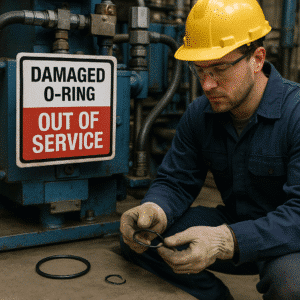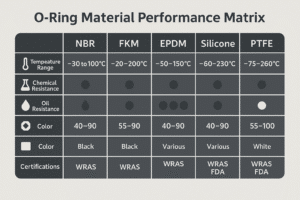So, you're probably wondering—what exactly is an oil seal and why should you care? It’s one of those unsung heroes in machinery, keeping everything running smoothly without you even noticing it. But trust me, when it fails, you’ll notice.
An oil seal keeps the fluids in and the dirt out, so your machinery can keep humming along. It’s simple, but crucial.
Let me walk you through how this tiny but mighty component works and why it’s so important to keep it in top shape.
What is an Oil Seal?
I’ll be honest, the first time I heard about oil seals, I had no idea how vital they were. But now, having spent a fair bit of time in the industry, I can tell you—they’re the little warriors that protect your machinery and make sure everything runs like it should.
- An oil seal works behind the scenes, preventing leaks and contamination to keep your machines happy and efficient.
Let me share a quick story. I remember visiting a factory where they explained how a single oil seal had saved thousands of dollars in maintenance. The machines were running 24/7, but because of these small parts, the risk of breakdown was reduced. It's incredible how something so simple can have such a huge impact on operations.
Types of Oil Seals
| Type | Material | Application |
|---|---|---|
| TC Oil Seal | NBR/FKM | Hydraulic systems |
| SC Oil Seal | NBR/FKM | Automotive engines |
| PTFE Lip Oil Seal | PTFE | High-temperature machinery |
Want to see our top-selling types? Visit our Oil Seal Product Page for more options.
What are the most common applications for oil seals?
You’d be surprised at how many industries rely on oil seals—they’re everywhere, from the engines of your car to the machines used in manufacturing plants.
- Whether it's in your car’s engine or heavy machinery, oil seals keep things running by preventing leaks and keeping contaminants out.
I’ve seen firsthand how oil seals protect everything from car engines to industrial pumps. For example, in automotive engines, oil seals stop engine oil from leaking and keep dirt and dust from getting inside—protecting your vehicle’s heart. In factories, they keep lubricants sealed tightly in machinery, helping to prevent breakdowns and costly repairs.
| Industry | Application | Common Oil Seal Used |
|---|---|---|
| Automotive | Engine and transmission | SC Oil Seal |
| Hydraulic | Pumps and cylinders | TC Oil Seal |
| Manufacturing | Gearboxes and machinery | PTFE Lip Oil Seal |
What causes oil seal failure?
Just like any part of your machinery, oil seals can wear out over time. The question is—what exactly causes them to fail?
- Extreme temperatures, physical wear, and contamination are the usual culprits behind oil seal failure. Regular checks can help you spot the problem early.
Here’s the thing—I once worked with a client who didn’t realize their oil seal was damaged until they started seeing oil leaks. The culprit? Too much heat and constant friction. When oil seals aren’t properly maintained or replaced, they can’t do their job anymore.
| Cause | Effect | Solution |
|---|---|---|
| Extreme Temperatures | Seal degradation | Use FKM or PTFE oil seals |
| Contamination | Seal failure, fluid leakage | Clean components regularly |
| Physical Wear | Friction and seal breakage | Replace seals after set cycles |
How do you choose the right oil seal?
Choosing the right oil seal depends on application, material, temperature, pressure, and operating fluid.
- Match the material to the environment: NBR for oil, FKM for heat, PTFE for chemicals.
| Factor | Importance | Ideal Choice |
|---|---|---|
| Material | Determines resistance to oil & heat | FKM seals |
| Temperature range | Impacts longevity | PTFE for >200°C |
| Pressure | Must resist system pressure | TC designs for hydraulics |
Need help with your specific system? Check out our guide on choosing rotary shaft seals for deeper insights.
What’s the difference between TC and SC oil seals?
This is a common question for engineers and mechanics alike.
| Feature | TC Oil Seal | SC Oil Seal |
|---|---|---|
| Structure | Double lip, rubber cover | Single lip, metal shell |
| Usage | Hydraulic cylinders | Engine crankshaft seals |
| Flexibility | More adaptable fit | Higher shaft speeds |
How to find a reliable oil seal supplier?
Choosing the right supplier is critical for long-term reliability. I've worked with many, and the best ones always offer fast delivery, consistent quality, and solid after-sales support.
| Factor | Why It Matters | Our Advantage |
|---|---|---|
| OEM Quality | Prevents premature failure | Yes, certified materials |
| No MOQ Policy | Easier to start small | Yes, no minimum order |
| Fast Response | Crucial for urgent sourcing | Instant WhatsApp |
Let’s Seal It Right from the Start
Oil seals might be small, but they’re the backbone of smooth machinery. Take care of them, and they’ll take care of your equipment.
Explore our Oil Seal Cross Reference Chart if you’re unsure what you need.
Let Us Help You Choose the Right Seal
Have questions about size, fit, or delivery?
📧 Email us at [email protected]
📱 Message us on WhatsApp


